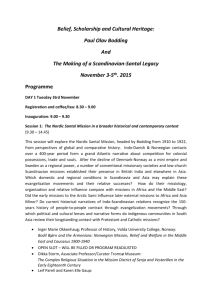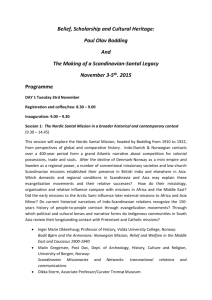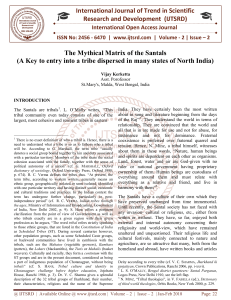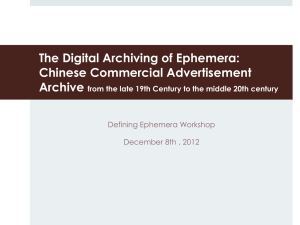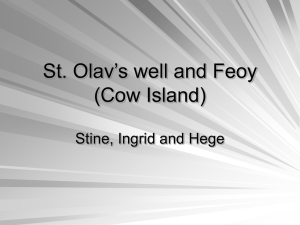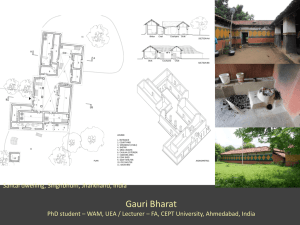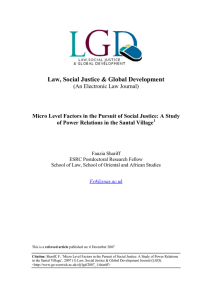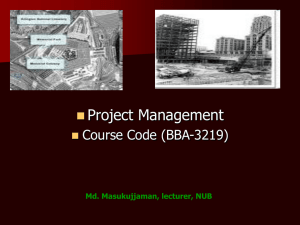Belief, Scholarship and Cultural Heritage
advertisement
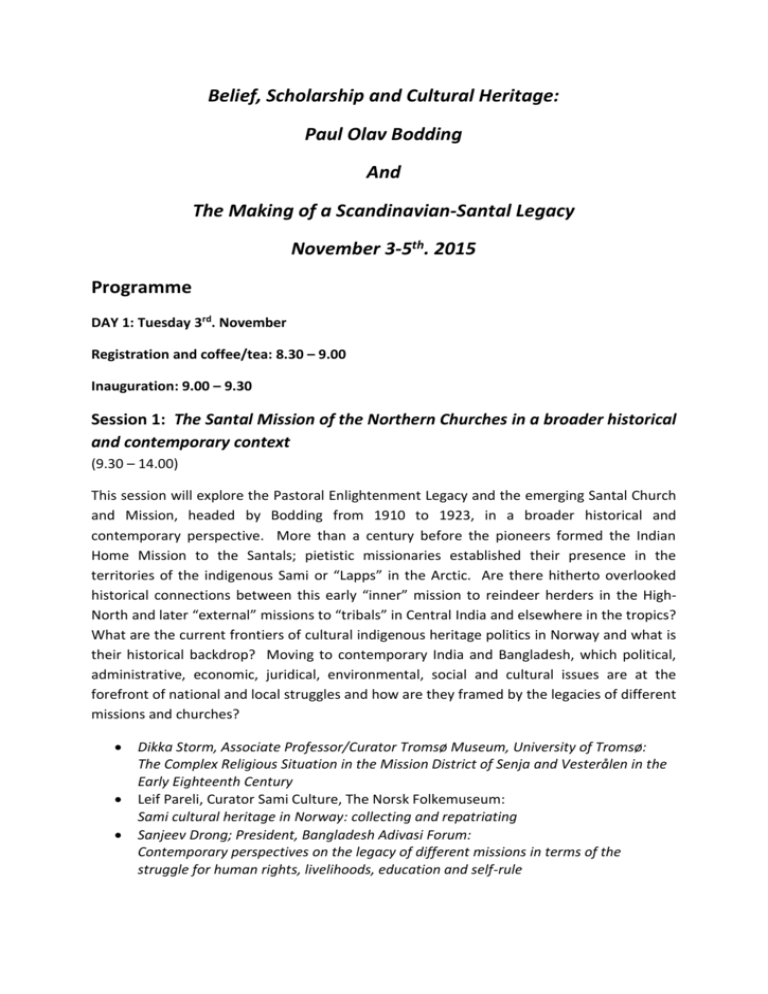
Belief, Scholarship and Cultural Heritage: Paul Olav Bodding And The Making of a Scandinavian-Santal Legacy November 3-5th. 2015 Programme DAY 1: Tuesday 3rd. November Registration and coffee/tea: 8.30 – 9.00 Inauguration: 9.00 – 9.30 Session 1: The Santal Mission of the Northern Churches in a broader historical and contemporary context (9.30 – 14.00) This session will explore the Pastoral Enlightenment Legacy and the emerging Santal Church and Mission, headed by Bodding from 1910 to 1923, in a broader historical and contemporary perspective. More than a century before the pioneers formed the Indian Home Mission to the Santals; pietistic missionaries established their presence in the territories of the indigenous Sami or “Lapps” in the Arctic. Are there hitherto overlooked historical connections between this early “inner” mission to reindeer herders in the HighNorth and later “external” missions to “tribals” in Central India and elsewhere in the tropics? What are the current frontiers of cultural indigenous heritage politics in Norway and what is their historical backdrop? Moving to contemporary India and Bangladesh, which political, administrative, economic, juridical, environmental, social and cultural issues are at the forefront of national and local struggles and how are they framed by the legacies of different missions and churches? Dikka Storm, Associate Professor/Curator Tromsø Museum, University of Tromsø: The Complex Religious Situation in the Mission District of Senja and Vesterålen in the Early Eighteenth Century Leif Pareli, Curator Sami Culture, The Norsk Folkemuseum: Sami cultural heritage in Norway: collecting and repatriating Sanjeev Drong; President, Bangladesh Adivasi Forum: Contemporary perspectives on the legacy of different missions in terms of the struggle for human rights, livelihoods, education and self-rule Lunch: 11.15 – 12.30 Nirmala Murmu, Community Organizer and Board Member of the Bodding Memorial Foundation, Dumka, India: The illegal mining in Tribal land and illegal grabbing of land property Trygve Nesse, MA, UiO: Rural democracy and primitive accumulation of capital in West Bengal and Jharkhand Lawrence Besra; National Coordinator, World Vision Bangladesh: The role of language and traditional social institutions for unity and nation-building: A critical retrospective of Bodding’s work in British India. (Coffee/tea 14.00 – 14.30) Session 2: Revisiting Bodding as theologian, bible translator, hymnologist and administrator (14.30 – 16.00) This session will address theological, historical and anthropological perspectives on Bodding as a controversial institutional reformer, the reasons for the mission’s so to say erasure of institutional memory about Bodding, his influential missiological writings, his bible translations and Kukli Puthi (the Question and Answer Book) with hymns Harald Tambs-Lycke, Professor Emeritus University of Picardie-Jules Verne, Amines, France: Picking up where the adventures left: Bodding’s burden in normalizing the Santal Mission Alf Henry Rasmussen, Rtd. missionary, Former Head of the Information Department in the Norwegian Santal Mission: Title to be confirmed Rev. Timothey Hembrom, Kolkata, India: An Indigenous theologian’s perspective on the Bodding Era compared to the Pioneer Era. (Online presentation) Reception at Oslo Townhall: 16.30 (all registered welcome - invitation by card) Day 2: Wednesday 4th November Session 3: Revisiting Bodding’s scholarship: the ethnographer, linguist and collector (8.30 – 12.00) This session will debate Bodding’s vast and diverse scholarship, including his production as a very prominent linguist, ethnographer and collector of ethnographic artifacts, prehistoric tools and manuscripts. Other papers will compare Bodding with other contemporary Scandinavian collectors and the nature of Bodding’s intellectual and personal relations to his Santal collaborators and contemporary Western scholars Marin Carrin, Rtd. Director of Research CNRS, Centre of Anthropology, Toulouse, France: The Making of an encyclopedic dictionary: how Bodding re-enchanted Santal words Santosh Soren, Affiliate Univ. of Copenhagen: Paul Olav Bodding and his helpers: an indigenous scholar’s perspective Rubi Hembrom, Founder and Publishing Director Adivaani and Creative Writer: The Santals and the Bodding Paradox (Coffee/tea 10.00 – 10.30) Toshiki Osada, Professor Emeritus, Research Institute of Humanity and Nature, Kyoto, Japan: Bodding as Linguist Mahendra Besra, Writer and PhD student, Sidhu Kanu University, Dumka, India: Paul Olav Bodding: A Motivation for a New Era Peter Birkelund Andersen, Associate Professor University of Copenhagen: Two generations of Scandinavian collectors in Assam compared: Halfdan Singer and Paul Olav Bodding Lunch: 12.00 – 13.15 Session 4 (held at the National Library of Norway): Scholars, writers, access and collaboration (13.30 – 16.30) This is the first of two sessions addressing new opportunities for collaboration opening up for scholars, writers, educators, publishers and current custodians of the Santals’ oral heritage, partly as result of the ongoing digitalization of the vast manuscript collection and of the other sub-collections. These new opportunities will be sought debated in the context of important current developments affecting public memory of this particular enlightenment tradition; including divisive language and educational policies, new trends in research and publishing in South Asia Johanne Ostad, National Library of Norway: Digitizing the Santal material in the National Library of Norway Shilpi Hembrom, Asst. Professor Centre for Human Rights and Conflict Management, Central University of Jharkhand, Ranchi, India: Bodding’s Legacy and Indo-Norwegian Collaboration: Prospect for Research and Investigation The Santal Literary and Cultural Society: past and future Norwegian-Santal Cooperation Joy Raj Eric Tudu, Activist and Consultant, Santal Parganas: Aboak Aidari: Towards cooperation beyond barriers Open Forum at the National Library: Informal discussion on possibilities for a revitalized scholarship and Indo-Bangladeshi-Scandinavian collaboration Open House at the Professor Residence: Exhibition Area 16.30 -- 18.30 (Upstairs) DAY 3: Thursday 5th November Excursion to the Ethnographic Santal collection (transport offered) 9.00 – 11.00 (for official guests only) Lunch: 11.15 – 12.30 Session 5: Towards a post-colonial and digital era of collection management (12.30 – 15.00) The session addresses the histories of the three sub-collections in the context of the rise of indigenous movements, international conventions and postcolonial critiques of “the colonial museum”. How is the politics of national and tribal museums and technological innovations – all challenging and enabling the collections to redefine their role in society? In which new ways can ethnographic, manuscript and photo archives be owned and managed? How can the collections be activated to meet the expectations of different constituencies of original indigenous custodians and owners in India, Bangladesh and elsewhere? Can educators’ and community involvement through digital communication inform museological practices in new, mutually constructive ways? Tone Bleie, Professor, Public Policy and Cultural Understanding University of Tromsø: The Santal Bodding Collection: unearthing its history over a century and looking towards the future Mohan Gautam, Rtd. Professor, University of Leiden: The politics of tribal museums in India Boro Baski, Head Ghosaldanga Bishnubati Adivasi Trust, West Bengal, India: The Museum of Santal Culture at Bishnubati: Its role in the education and preservation of Santal culture and heritage Jørgen Nørgaard Pedersen, Volunteer Coordinator for Danmission Photo Archive (formerly General Secretary, Danish Santal Mission): Preserving photographs and documents digitally (Coffee/tea 14.30 – 15.00) Panel session: Towards a foundation for collaborative management and knowledge sharing (15.00 – 16.30) Concluding session with light refreshments (16.30 – 17.30)
